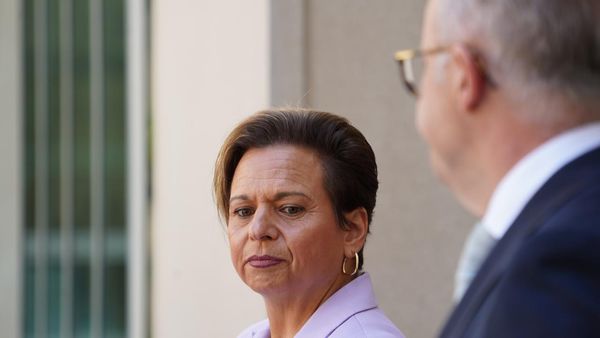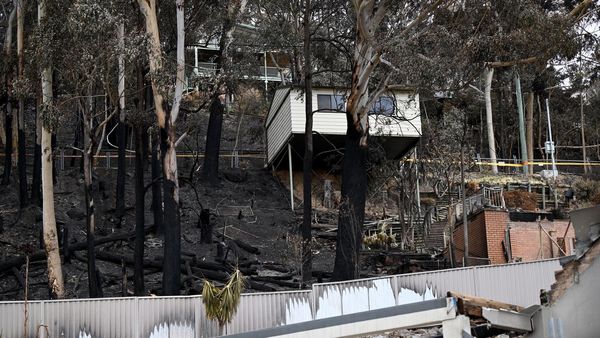
Two Jesuit priests heard gunshots coming from their church in the mountains of the Mexican state of Chihuahua.
When they arrived they found a local tourist guide bleeding out at the altar. Standing over him was the local boss of the country’s most powerful organized crime group, the Sinaloa cartel.
One of the priests began giving the last rites to the wounded man, but the gunman shot him before turning and opening fire on the second cleric.
By then, a third priest had arrived. The drug boss, known as “El Chueco” or “The Crooked One”, confessed his sins to him, and then he took the bodies away in a pickup truck.
News of the murders caused outrage across Mexico and the world. Pope Francis weighed in, decrying the high number of homicides in the country. The Catholic dioceses of Mexico demanded the government review its security strategy in light of the murders.
The Mexican government promised swift justice, but three weeks after the murders, El Chueco remains on the loose.
The brazen murders of the Jesuits has highlighted growing violence in rural Mexico and the risks which the country’s Catholic priests face every day as they tend to their communities.
Homicides have surged in rural regions throughout the country as criminal groups wage wars to take over greater swaths of territory. And priests are caught in the crossfire.
They have few security assurances in these regions and often walk a fine line between speaking out in defense of their parish, and avoiding the deadly anger of powerful crime groups which operate in open defiance of the authorities.
El Chueco, José Noriel Portillo Gil, too, has long enjoyed such impunity.
In 2018, Portillo shot dead an American tourist, prompting state officials to promise they would spare nothing to capture him. Instead, the narco-trafficker continued to run his cartel, terrorize residents and openly commune with local mayors and police chiefs, according to a source who knows him.
This level of impunity is not new to priests who work in rural regions across Mexico.
Eighty per cent of murders, disappearances and extortions of priests have gone unsolved, according to December report by the Catholic Multimedia Center.
The report found that extortion, and attacks against churches, have increased over the three years since President Andrés Manuel López Obrador took office. The leader, popularly known as Amlo, came to power promising “hugs not bullets”, which he promised would reduce soaring murder rates in the country. Instead, experts say, the approach has only emboldened criminal groups to become more violent and expand territorial control across the country.
Calderón sends in the army
Mexico’s “war on drugs” began in late 2006 when the president at the time, Felipe Calderón, ordered thousands of troops onto the streets in response to an explosion of horrific violence in his native state of Michoacán.
Calderón hoped to smash the drug cartels with his heavily militarized onslaught but the approach was counter-productive and exacted a catastrophic human toll. As Mexico’s military went on the offensive, the body count sky-rocketed to new heights and tens of thousands were forced from their homes, disappeared or killed.
Kingpin strategy
Simultaneously Calderón also began pursuing the so-called “kingpin strategy” by which authorities sought to decapitate the cartels by targeting their leaders.
That policy resulted in some high-profile scalps – notably Arturo Beltrán Leyva who was gunned down by Mexican marines in 2009 – but also did little to bring peace. In fact, many believe such tactics served only to pulverize the world of organized crime, creating even more violence as new, less predictable factions squabbled for their piece of the pie.
Under Calderón’s successor, Enrique Peña Nieto, the government’s rhetoric on crime softened as Mexico sought to shed its reputation as the headquarters of some the world’s most murderous mafia groups.
But Calderón’s policies largely survived, with authorities targeting prominent cartel leaders such as Sinaloa’s Joaquín “El Chapo” Guzmán.
When “El Chapo” was arrested in early 2016, Mexico’s president bragged: “Mission accomplished”. But the violence went on. By the time Peña Nieto left office in 2018, Mexico had suffered another record year of murders, with nearly 36,000 people slain.
"Hugs not bullets"
The leftwing populist Andrés Manuel López Obrador took power in December, promising a dramatic change in tactics. López Obrador, or Amlo as most call him, vowed to attack the social roots of crime, offering vocational training to more than 2.3 million disadvantaged young people at risk of being ensnared by the cartels.
“It will be virtually impossible to achieve peace without justice and [social] welfare,” Amlo said, promising to slash the murder rate from an average of 89 killings per day with his “hugs not bullets” doctrine.
Amlo also pledged to chair daily 6am security meetings and create a 60,000 strong "National Guard". But those measures have yet to pay off, with the new security force used mostly to hunt Central American migrants.
Mexico now suffers an average of about 96 murders per day, with nearly 29,000 people killed since Amlo took office.
Last year, three priests were murdered in Mexico. One was abducted, shot dead and left by the side of a road in the state of Guanajuato. Another was killed in the state of Durango after he got caught in the crossfire of a gun battle on his way to his church. A third was beaten to death inside his church in the state of Morelos in September.
When prominent clergy demanded a change in security strategy following the most recent murders in Chihuahua, López Obrador demurred.
“What do priests want?” he asked in a morning press conference, in response to the demands. “That we resolve problems with violence?”
Father Luis Gerardo Moro, leader of the Jesuits in Mexico, said his community did not believe in violence. “We are demanding a minimum respect for humanity,” he said, responding to the president’s remarks.

Meanwhile, homicides have soared throughout rural Mexico. And cartels have become ever more bold. Three weeks ago, in the state of Chiapas, cellphone videos showed scores of heavily armed men taking over the streets of San Cristóbal de Las Casas in a blatant display of force in the city.
In the state of Guerrero, seven members of one family were shot down in their own home earlier this week. And a little over two weeks ago, gunmen shut down streets and set buses on fire in Matamoros, Tamaulipas, after their leader was captured.
Catholic priests often find themselves on the frontlines of these turf wars between criminal factions.
For Father Carlos Aurelio Ramírez Moreno, in the state of Michoacán, that means avoiding checkpoints controlled by the Jalisco New Generation cartel, Mexico’s most feared organized crime group which is trying to take over the town where Ramírez works.
The town has taken up arms to defend itself against the cartel, and Ramírez has encouraged them – putting him squarely in the sights of the Jalisco gunmen. He said his flock had no other choice but defend themselves, because the government will not come to their aid.
“If they drop their weapons, they’ll be vulnerable,” Ramírez said. “They know they cannot depend on the government.”
Cartel spies keep tabs on him, and less than a month ago, a gunman fired on his vehicle as he was leaving the town. He escaped harm, and remains undeterred, he said.
He reported the attack to the Federal Mechanism for Protection of Human Rights Workers and Journalists, which is charged with protecting him, but he expects little help from López Obrador’s government.
“This leader is a [Pontius] Pilate who washes his hands,” Ramírez said. “He doesn’t have the character to execute the rule of law.”







